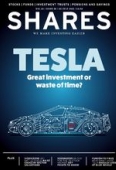Archived article
Please note that tax, investment, pension and ISA rules can change and the information and any views contained in this article may now be inaccurate.
Morrisons bid battle could raise grocery sector valuations

A bidding war for the UK’s fourth-largest grocery chain WM Morrison (MRW) has put the spotlight on the food retail sector and pushed up valuations of other companies in the space.
Investors have taken the view that supermarkets and other food retail-related businesses should be worth more if there is considerable takeover activity around Morrisons, where three private equity companies have either bid or expressed an interest, namely CD&R, Fortress and Apollo.
Tesco (TSCO) has seen its share price rise 5.9% to 234.75p since Morrisons’ takeover interest was first revealed on 19 June. Marks & Spencer’s (MKS) shares have gone up 5.4% to 156.65p over the same period, with its food retail operations considered the group’s key sales growth driver.
The biggest riser of the three has been Sainsbury’s (SBRY) whose shares have gone up 7.3% to 279.1p, with the company seemingly considered to be the most likely takeover target.

IMPORTANT METRICS
With private equity takeovers, the key ratio when assessing deals is enterprise value to free cash flow as it shows how quickly the cost of an acquisition can be paid back.
However, Morrisons reported £450 million of negative free cash flow in the year to January due to lower profits and the temporary impact of lower fuel sales, higher stock levels and its decision to pay small suppliers quickly so that they survived during the pandemic.
Therefore, Fortress has pitched its offer at an enterprise value (market value plus net debt) of 8.3 times underlying EBITDA – earnings before interest, tax, depreciation and amortisation – for the past year instead.
This is a higher multiple of EBITDA than the Issa brothers and TDR Capital paid for Asda, although that supermarket likely had a higher level of 12-month trailing EBITDA.
READ-ACROSS TO OTHER STOCKS
Fortress’ offer is substantially higher than the current enterprise value to EBITDA multiples of Morrisons’ key competitors in the UK grocery retail sector.
Market leader Tesco, which owns the freehold to around 60% of its stores and therefore also has significant asset backing, is trading on 6.6 times last year’s EBITDA according to Refinitiv. Marks & Spencer is trading on an identical multiple to Tesco, while Sainsbury is trading on just 4.5 times EBITDA.
That means in a comparative takeover situation the uplift to the valuations of M&S and Tesco could be 25% while theoretically the uplift for Sainsbury’s could be over 80%. It is worth stressing that none of these companies are currently in takeover talks and that these figures are merely illustrations of what to expect if private equity did show an interest in other parts of the food retail sector.
Ultimately, if a bidding war does develop for Morrisons, valuations could go higher still, not just for the retailers but also for investors in retail assets like Supermarket Income REIT (SUPR), although higher prices could translate into lower yields in the very long term.
NEXT STEPS FOR MORRISONS
As it stands, Morrisons remains the focal point for takeover activity in the sector. Its shares at 266.83p are now trading 50% higher than on the eve of when CD&R’s interest first went public.
CD&R’s 230p per share proposal was rejected and then Morrisons’ board subsequently recommended a 254p per share offer from Fortress. On 5 July, Apollo said it was evaluating a possible offer, pushing up the share price even further.
Apollo narrowly missed out last year on buying Asda, the UK’s number three grocery chain by market share, which was sold to private buyers backed by TDR Capital for £6.8 billion.
It has almost $50 billion of cash available for investment, making it a serious contender.
There have also been persistent rumours that Amazon, which has a grocery joint venture with Morrisons, might also be considering an approach.
TICKING THE RIGHT BOXES
The timing of the private equity interest in Morrisons is consistent with the standard approach for the sector, wherein buyers look for companies which have been through a tough period, reorganised themselves and emerged stronger, meaning they need less cash to support them.
While they have benefited from higher sales during the pandemic, the supermarket chains have spent hundreds of millions of pounds on protecting their staff and customers from Covid, on hiring additional staff to cover absences due to sickness, and on reshaping their businesses to cope with the surge in online shopping, while at the same time cutting overheads.
With those costs now sunken and margins improving, private equity buyers can reap the rewards of the target companies’ hard work through rising cash flows which otherwise would have gone to shareholders in the form of increased dividends.
Morrisons is also asset-rich, as it owns the freehold to 85% of its stores. By some estimates, the value of its stores even outstrips the Fortress bid.
One of the reasons for Morrisons’ board recommending the Fortress bid is the promise that it would respect the history and culture of the business and not make any radical changes.
Fortress also promised to honour the recent £10 per hour pay award, not to raid the pension scheme and not to engage in a mass sale and leaseback of its substantial owned-store portfolio.
Important information:
These articles are provided by Shares magazine which is published by AJ Bell Media, a part of AJ Bell. Shares is not written by AJ Bell.
Shares is provided for your general information and use and is not a personal recommendation to invest. It is not intended to be relied upon by you in making or not making any investment decisions. The investments referred to in these articles will not be suitable for all investors. If in doubt please seek appropriate independent financial advice.
Investors acting on the information in these articles do so at their own risk and AJ Bell Media and its staff do not accept liability for losses suffered by investors as a result of their investment decisions.
Issue contents
Editor's View
Feature
- Why Tesla is a bad investment
- Why Tesla is a good investment
- Stiff competition stymies Liontrust ESG investment trust launch
- Stocks making highs and lows and how investors can use this information
- Tesla: Great investment or waste of time?
- Governments near agreement on global corporate tax ‘alignment’
- The winning and losing investments so far in 2021

 magazine
magazine








